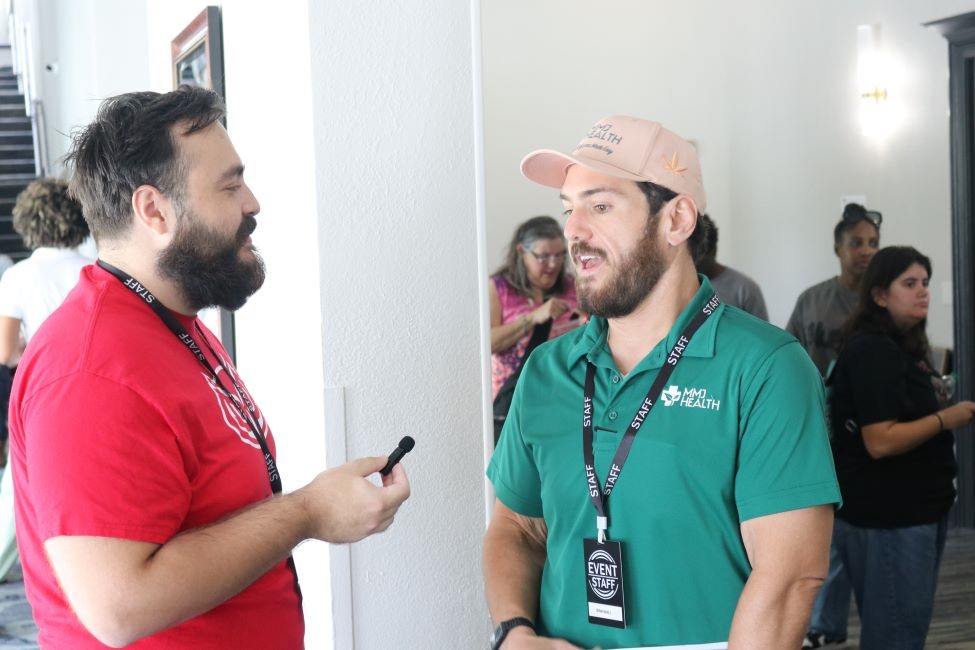MediaLab@FAU Partnership with PolCom, Mainstreet Sees Polls Published

MediaLab@FAU's Christian Gangan interviews Marshall Morgan, the CEO of MMJ Health, at an event in West Palm Beach in April (Photo by Reese Handley, also a MediaLab student).
Florida Atlantic University’s MediaLab@FAU has seen continued success obtaining coverage for its students’ original reporting. The program recently partnered with the FAU Political Communication and Public Opinion Research Lab (PolCom Lab) and Mainstreet Research USA, resulting in timely polls that have been published in several media outlets, including the Miami Herald, Sun Sentinel and WLRN.
MediaLab@FAU is a faculty-led and student-powered community reporting journalism initiative, and part of a special topics course housed in the School of Communication and Multimedia Studies within the Dorothy F. Schmidt College of Arts and Letters.
Christian Gangan and Morgan Harms, both seniors majoring in multimedia studies, are part of the team of students to lead this successful initiative.
“My inspiration of getting involved with MediaLab all started because of professor Ilene Prusher,” said Gangan. “She’s very open-minded and will let you write anything you want if you pitch it to her. When the opportunity came to participate in polling, I was pretty curious about the answers we would get. I was always thinking how to make the question better or make it easy to read for the person answering.”
Gangan’s future aspirations include working for sports media. Harms, who is already a freelance writer and intern for Miami Living Magazine, hopes to continue writing for the publication and others while preparing to apply to graduate schools.
“I got involved with MediaLab for a couple of reasons, primarily because I wanted more experience in news reporting, and it seemed like such a great opportunity to do so,” Harms said. “I also think professor Prusher is an amazing teacher and mentor, and I really wanted to learn from her for another semester. I thought the idea of conducting a poll was really interesting. I’d never been a part of something like that before, and I know it’s very possible that I won't have the opportunity to do something like that again.”
Recent polling stories picked up by outside outlets include “Floridians say hurricanes worsening due to climate change. Trump Republicans agree, says poll,” and following the recent shooting at Florida State University, “80% of Floridians oppose reverting to pre-Parkland gun laws, poll finds.”
“This has been an incredibly exciting experience because it’s given our students the ability to put their heads together in the newsroom and ask, beyond the usual horse race coverage we often see during election time, what really matters to Floridians across the state, across many demographic groups,” said Prusher, multimedia journalism senior instructor and founder of the MediaLab program, as well as its digital director. “I led the students in a brainstorming session to come up with the questions they felt it most important to ask now: What would we most like to ask to get a better picture of where Floridians are on various issues?”
Kevin Wagner, Ph.D., FAU professor of political science and co-director of the PolCom Lab, helped to streamline the polling process.
“Working with the MediaLab team gave our students an opportunity to apply the methods of political science in a real-world, collaborative setting,” he said. “It was exciting to see them engage critically with question design, sampling and interpretation – skills that are essential in both politics and journalism. What made this project so meaningful was the chance for students to see how their academic work could contribute directly to public understanding. They weren’t just learning about polling; they were learning how to inform democratic discourse. It's part of bringing our classrooms into the larger world.”
Prusher also believes the collaboration will help the students further down the line.
“We vetted the questions again and again, with an eye toward avoiding inherent biases, leading questions, or questions that might be confusing or easily misunderstood,” said Prusher. “We learned that political scientists call each poll an instrument, and no instrument is perfect – but it can present a more accurate and nuanced picture of a representative group of people at a given time. At the end of the day, we in the world of journalism are truth seekers, and I think polls like these are a chance to get a little closer to the truth about how voters feel about the issues of our day.”
For more information about MediaLab@FAU, visit here or email iprusher@fau.edu.
-FAU-
Latest News Desk
- FAU Lab Schools Shine Nationwide in Niche RankingsA.D. Henderson University School and Florida Atlantic University High School ranked among the best in the country and state, according to Niche in its 2026 rankings.
- FAU Joins Neuroarts Academic Network to Bridge Art, Brain and HealingFAU will help to lead this global effort to harness aesthetic experiences for brain health, as one of just two Florida universities and about 35 worldwide in the network's initial working group.
- Chatbots the New 'Doc?' Exploring AI in Health Behavior CoachingChanging habits is tough. AI tools like ChatGPT now simulate motivational interviewing (MI), showing promise - but can they match MI's core and spark lasting change? FAU researchers explore the potential.
- FAU's MBA in Sport Management Ranks Third in Global RankingsFlorida Atlantic University's MBA in Sport Management program online ranked No. 3 worldwide for 2025, according to SportBusiness, a London-based sports intelligence and analysis firm.
- FAU Hosts 'The Florida Jewish Experience' SymposiumThe Jewish Studies Program in Florida Atlantic University's Dorothy F. Schmidt College of Arts and Letters presents "The Florida Jewish Experience" symposium.
- Study First to Show if Nesting Heat Affects Sea Turtle Hatchling 'IQ'FAU researchers are the first to train loggerhead sea turtle hatchlings in a maze using visual cues to test their learning and ability, and to determine if high nest temperatures impair their cognition.






